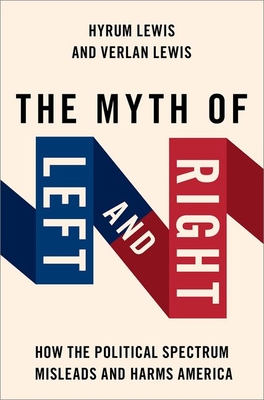What do you think?
Rate this book


168 pages, Hardcover
Published January 6, 2023
“A conservative or liberal is not someone who has a conservative or liberal philosophy, but someone who belongs to the conservative or liberal tribe. This means that ideologies do not define tribes, tribes define ideologies; ideology is not about what (worldviews), it is about who (groups); there is no liberalism or conservatism, only liberals and conservatives; and the political spectrum does not model an essential value, but only tribes and what they stand for at a specific time and place.”
The authors, Verlan Lewis and Hyrum Lewis, make a pretty good case that the one-dimensional political spectrum everyone uses for convenient pigeonholing of others and themselves is (let's see…) historically illiterate, inherently fallacious, and profoundly damaging to ourselves and our political discourse. The book's argument is presented in an accessible and punchy style. I get it, and I'm probably going to be a lot more careful about ideologizing people (and myself) in the future.
The authors' look at the history of "left" and "right" politics is illuminating. You might remember from a high school history course that it originated in the seating arrangements of the post-revolution French legislature, with stodgy monarchy supporters on the right, wild-eyed radicals on the left. How could that possibly apply to American politics?
Well, for a long time, it didn't. The authors note that the "spectrum" simply wasn't a part of political discourse in America until the 1920s; before that, we just had a bunch of politicians and statesmen taking stances on issues. Hard to believe, I know! (Later, historians and pundits tried to shoehorn previous pols into the spectrum, unconvincingly.)
The authors identify "left" and "right" as essentially tribal positions. You, you typical voter you, first associate yourself with your political party, then (and only then) do you try to fit in, discovering that your positions on the issues just happen to coincide with the prevailing positions of your party.
The authors (entertainingly) debunk efforts to explain the one-dimensional spectrum in any other way than tribalism. Even the sainted Thomas Sowell's dichotomy of "constrained" vs. "unconstrained" political visions is rebuffed.
The authors' association of the spectrum with today's political parties is probably the least convincing bit of the book. Republicans have their ideological fractures (just ask Kevin McCarthy or any never-Trumper). So do Democrats, although I think they do a better job of hiding it. In any case, they are very leaky pigeonholes.
But the "tribalism" accusation can sting. Am I being tribal in my general disdain for Democrats? Especially when I disrespect a lot of Republicans too? I can't even stand many of the Libertarian Party pols these days.
But the strongest part of the book is the authors' description of where this tribalism (or "ideological essentialism", as the authors describe it) has taken our political discourse: right into the toilet. We are forever asked "which side are you on". The "other side" is not just people you disagree with on a number of issues; they are the enemy, who want to destroy the country, and probably you too. Tribal people are especially prone to nasty biases, especially confirmation bias. (I can confidently refuse to believe anything reported by the New York Times, because…). Every election becomes a "Flight 93 Election". Storm the cockpit!
The authors offer some advice, which I promise to take: stop the manichaean pigeonholing of others (and, if necessary, yourself). Disaggregate positions on issues from the one-dimensional spectrum; it's sloppy and stupid to dismiss someone as a left-winger because of their position on abortion; just describe them as pro-abortion. Check.
It's a short book, with a lot of end matter. According to my Kindle, the main text stops at page 100. The Notes section takes up pages 101-148, and the Index is on pages 149-160. My only gripe is that this makes the Kindle's estimates of remaining reading time of the book way off.